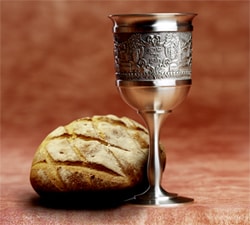
A common mistake with regard to the Lord’s Table is that of thinking that something is happening here that never happens anywhere else in the world. But it would be more accurate to say that the thing that distinguishes this Table is with whom it happens . . . not what happens.
This is what I mean. Paul teaches us in Corinthians that in the Old Testament, the priests were partakers of the altar. “Behold Israel after the flesh: are not they which eat of the sacrifices partakers of the altar?” (1 Corinthians 10:18). But all the debates that Christians have had about what occurs in the Supper here . . . we haven’t had with regard to the Old Testament sacrifices. But they were partakers, just as we are.
And this is even true if we are talking about idol worship. Whatever happens in the Lord’s Supper is something that also happens in the temple of Chemosh. “Ye cannot drink the cup of the Lord, and the cup of devils: ye cannot be partakers of the Lord’s table, and of the table of devils” (1 Corinthians 10:21). The thing that distinguishes is not the presence or absence of the partaking, but rather the presence or absence of the Lord Jesus.
It is analogous to a man and his wife being one flesh (Eph. 5:31). It is also the case that a man and a prostitute are one flesh (1 Cor. 6:16). The divide between them is ethical, not metaphysical. Everyone partakes, but some partaking is unholy.
So this meal is not set apart because a miraculous partaking occurs here that never occurs anywhere else. No. We live in a world filled with partaking—it is a covenantal world, after all—and in this meal we are graciously invited to partake of our Savior and Lord. And this means that if we eat His flesh and drink His blood, this is a partaking that means that we must not partake elsewhere.

